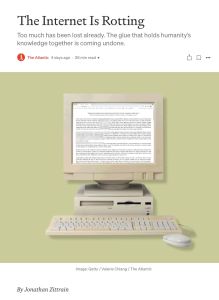
Article
The Internet Is Rotting
Too much has been lost already. The glue that holds humanity’s knowledge together is coming undone.
The Atlantic,
2021
Recommendation
The people who designed the internet weren’t trying to become billionaires. They designed it to be decentralized, anticipating that users would provide content and capacity. As Jonathan Zittrain reports in The Atlantic, when Tim Berners-Lee wrote website protocols, he built in links to take you to the content you want with a click. In today’s world, knowledge that libraries once stored now relies on links for preservation. But links can be unreliable and fall apart, putting vast stores of knowledge at risk. Some initiatives now underway might help.
Summary
About the Author
Jonathan Zittrain is a law and computer-science professor at Harvard University where he co-founded the Berkman Klein Center for Internet & Society.















Comment on this summary